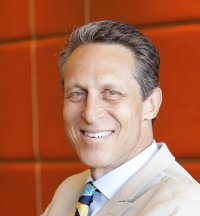Cleveland Clinic Partners with Dr. Mark Hyman and IFM to Launch Pioneering Functional Medicine Center

“If we can show that we have better outcomes and it’s cheaper to take a functional approach, in the end, the doctors who adopt this model—and their patients—they will be the ones who win.” —Mark Hyman, MD
This is Institute for Functional Medicine (IFM) president Mark Hyman, MD, in an article in the widely read political blog The Daily Beast in June 2014 in which he mentioned that he was working with the Cleveland Clinic to create a program in functional medicine.
Program Head, Mark
Hyman, MD
On September 15, 2014, an article in Crain’s Cleveland Business propelled news of the program nationally. The moved by the highly-regarded Cleveland Clinic is not merely a dabbling into the field but a full partnership with IFM, according to the release from the Cleveland Clinic. IFM’s chief medical officer, Patrick Hanaway, MD will be on the ground in Cleveland with author Hyman also serving in leadership.
The Crain’s article notes a strong research focus in the partnership: “Plans for the center include four clinical trials focusing on the treatment of asthma, inflammatory bowel disease, type 2 diabetes and migraines.” Cleveland Clinic CEO Toby Cosgrove, MD said the new center is “not a departure for Cleveland Clinic, but a continuation of the innovative, holistic approach that we have embraced.” He noted that that Clinic already has a Wellness Institute, Center for Integrative Medicine, the Center for Personalized Healthcare and a Chinese herbal therapy clinic.
Enjoying this article? Subscribe and get our latest, delivered straight to your inbox.
The Center will be rolled out to the Cleveland community at four events that include a showing of Fed Up, “a documentary that examines the role of the food industry in the ongoing childhood obesity epidemic.”
Comment from Integrator editorial adviser Glenn Sabin: What will this clinical and business model look like? This news represents a watershed moment for the integrative health and medicine field, and specifically functional medicine. The duo of IFM leaders Drs. Hyman and Hanaway and the partnership with IFM is potent. Add clinical trials looking at patient outcomes across a few pathologies to start, and this gets even more interesting. I can only surmise that a whole system, non-reductive approach is the direction they are headed. These are masterstrokes of genius to bring functional medicine into the mainstream. I imagine these plans were in the works for quite some time.
Cleveland Clinic is modeled like Mayo Clinic in that their providers are all salaried. The focus is where it needs to be: squarely on health creation and patient outcomes. However, one cannot be seen by Dr. Hyman in his private clinic (Ultrawellness Center) without paying a significant sum. His center does not accept insurance; he has limited clinical time and is in great demand.
I am quite curious as to how deep Cleveland Clinic will go in terms of embracing a model of comprehensive functional labs looking at biochemical milieu to inform recommendations of well-placed nutraceuticals. Is Cleveland Clinic ready to launch a natural pharmacy featuring pharma-grade nutraceuticals, ala Metagenics, to accompany the Crane Herb Company products they now stock for their Chinese herbal therapy clinic?
Lots more questions than answers here, but this is incredibly intriguing. My first thought on reading this was to send a note to colleagues Taylor Walsh and John Weeks that simply said: “We have reached the tipping point.”
Integrator Comment: I like juxtaposing Sabin’s “tipping point” with Cosgrove ho-hum placement of the IFM partnership as merely creating a full house of four prior initiatives. The clinic, in his presentation, has already “tipped” via wellness, integrative medicine, personalized medicine and the recent, widely reported engagement with Crane on that firm’s compounding of Chinese herbals.
Sabin’s point is well-made that the system behind this, Cleveland Clinic, has an employed physician model. This creates separation from the self-serving focus on producing services that dominates the US medical industry. Employed physicians are more likely, as Sabin comments, to focus “squarely on health creation and patient outcomes.”
Unless Cleveland Clinic sells functional medicine as part of a program for corporate executives and Cleveland’s wealthy, the migration of this model into this system will need a rather different fee schedule than Hyman’s private clinic. There, an 80 minute visit with the indefatigable Hyman runs a pricey $1500 and 50 minutes with a nutritionist will set you back $240. Hyman’s fame as author and doctor to the Clintons accounts for some of the pricing, and at the same time many functional medicine doctors jack that first visit fee skyward. How is a physician to make a good living when the main procedure is the Wholistic evaluation and management?
There is also, of course, also the procedure of moving product through one’s in-house pharmacies. Functional medicine patients typically leave with bag of natural medicines, a.k.a. the as-yet not very thoroughly researched dietary supplement polypharmacy.
The talk in the announcements of the partnership is all about healthy lifestyle. The rub in this relationship is likely to be the products. Here’s hoping that this IFM-Cleveland clinic partnership will model a functional health and medicine that does two things. First, they must find an affordable price point. More importantly, they must deeply engage, with proactive use of groups and team care, a core focus on the human-to-human technologies for moving people to better lifestyle choices, rather than reducing a patient’s road to functionality to the popping of new brands of pills.
Weeks’ Integrator Blog News & Reports and monthly Integrator Round-up are considered top sources on policy, business and academic developments for the field. He is also executive director of Academic Consortium for Complementary and Alternative Health Care (ACCAHC) where he directs the Center for Optimal Integration: Creating Health. He speaks widely on the policy, business and history of the movement for integrative health and medicine.





















